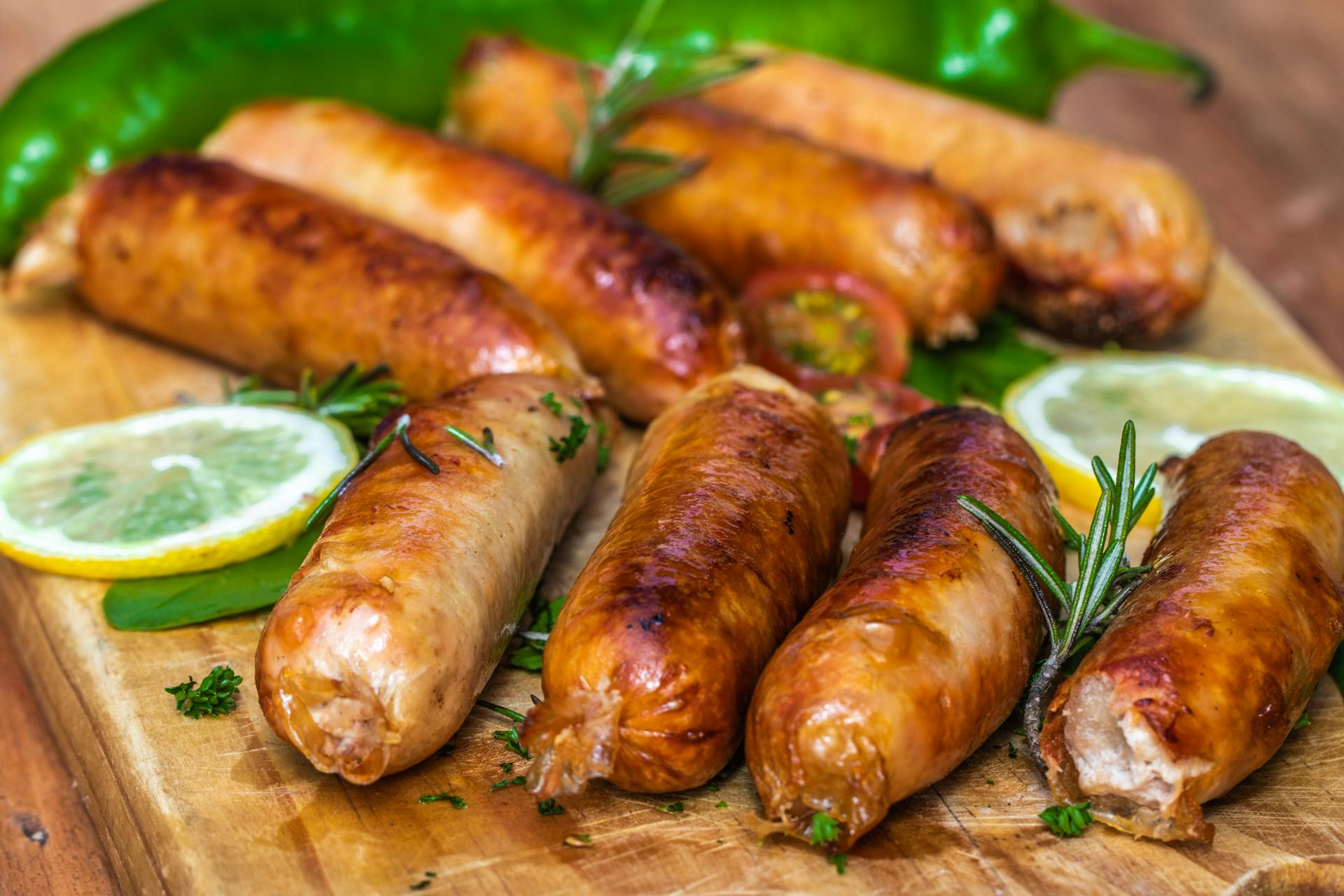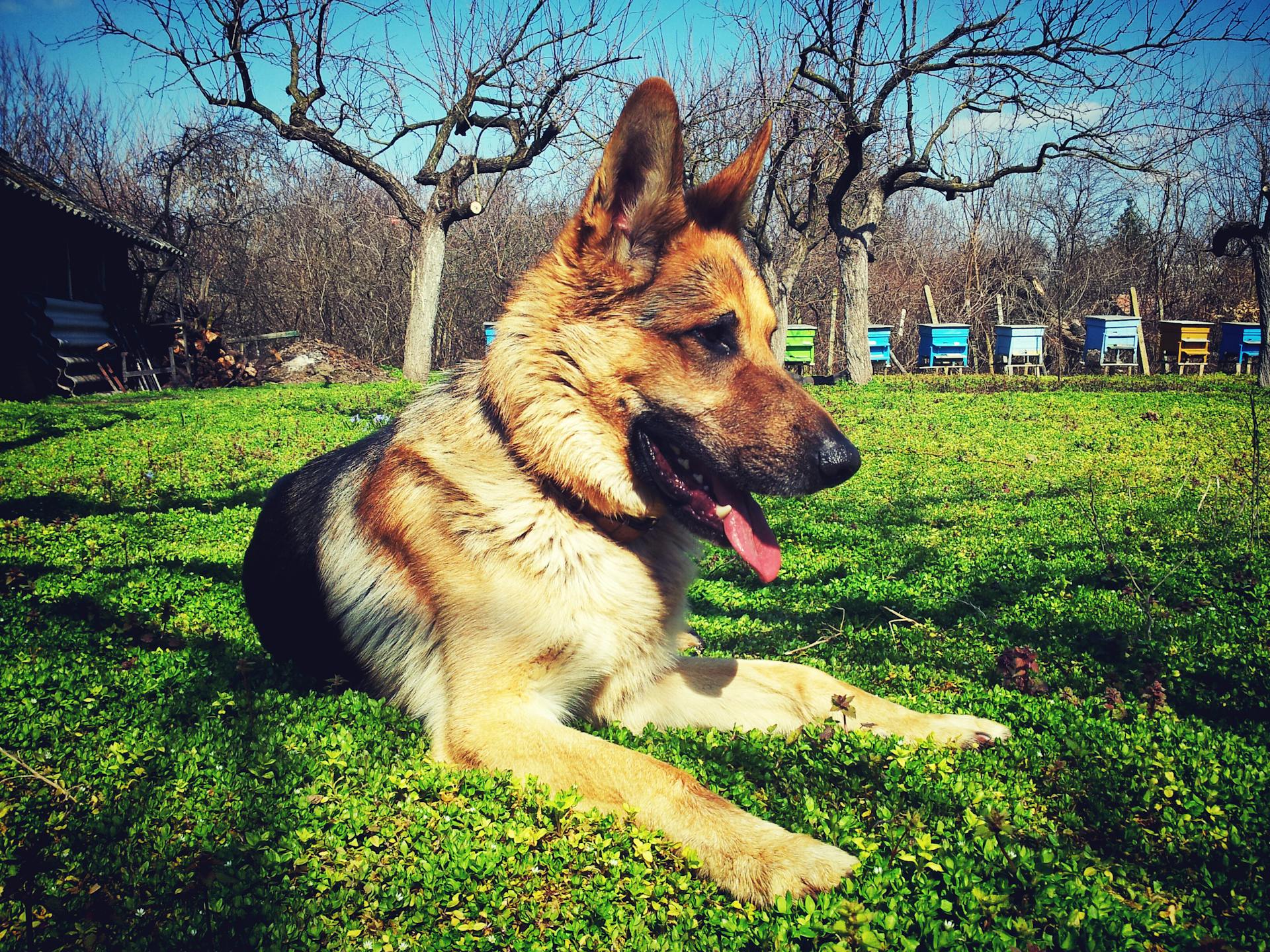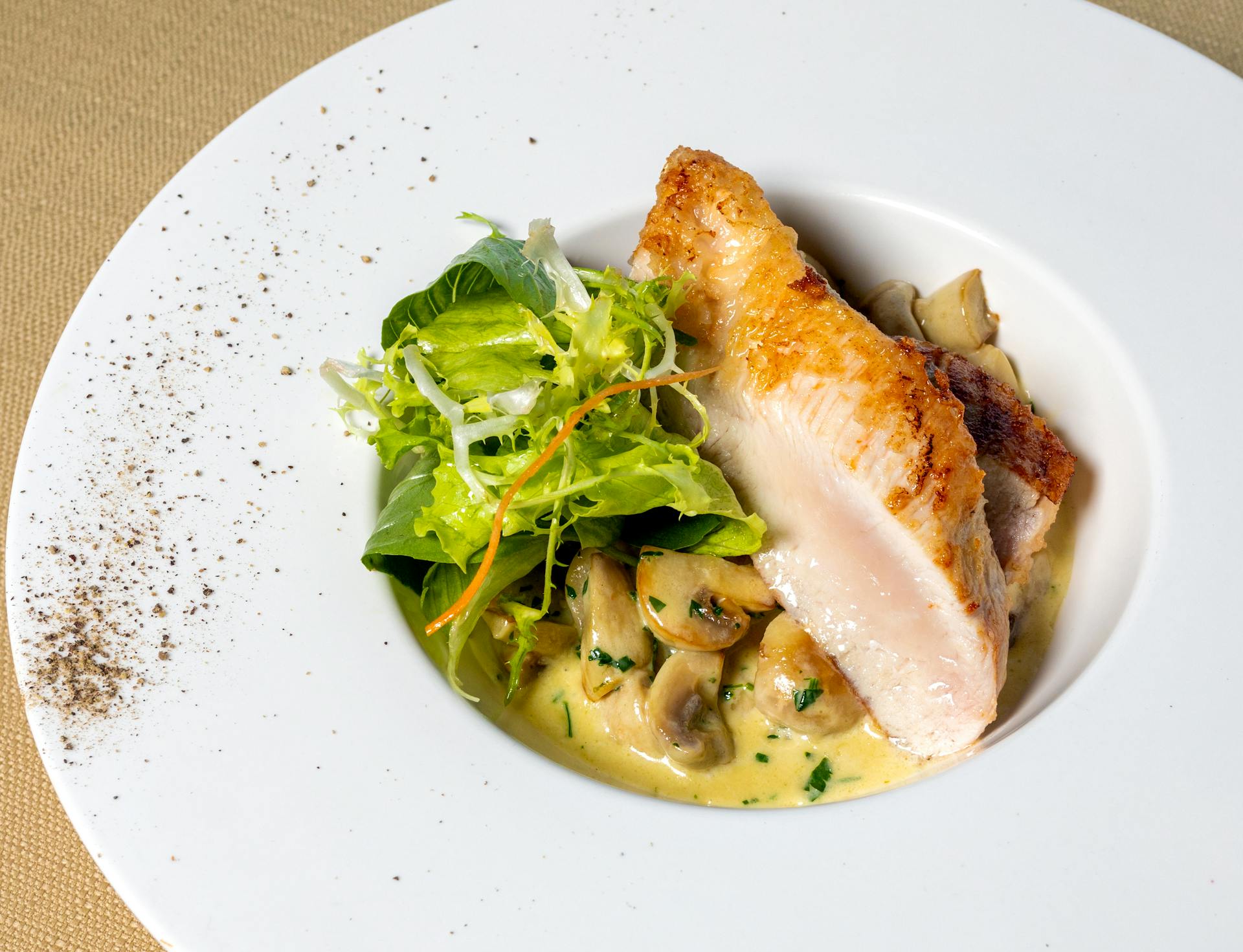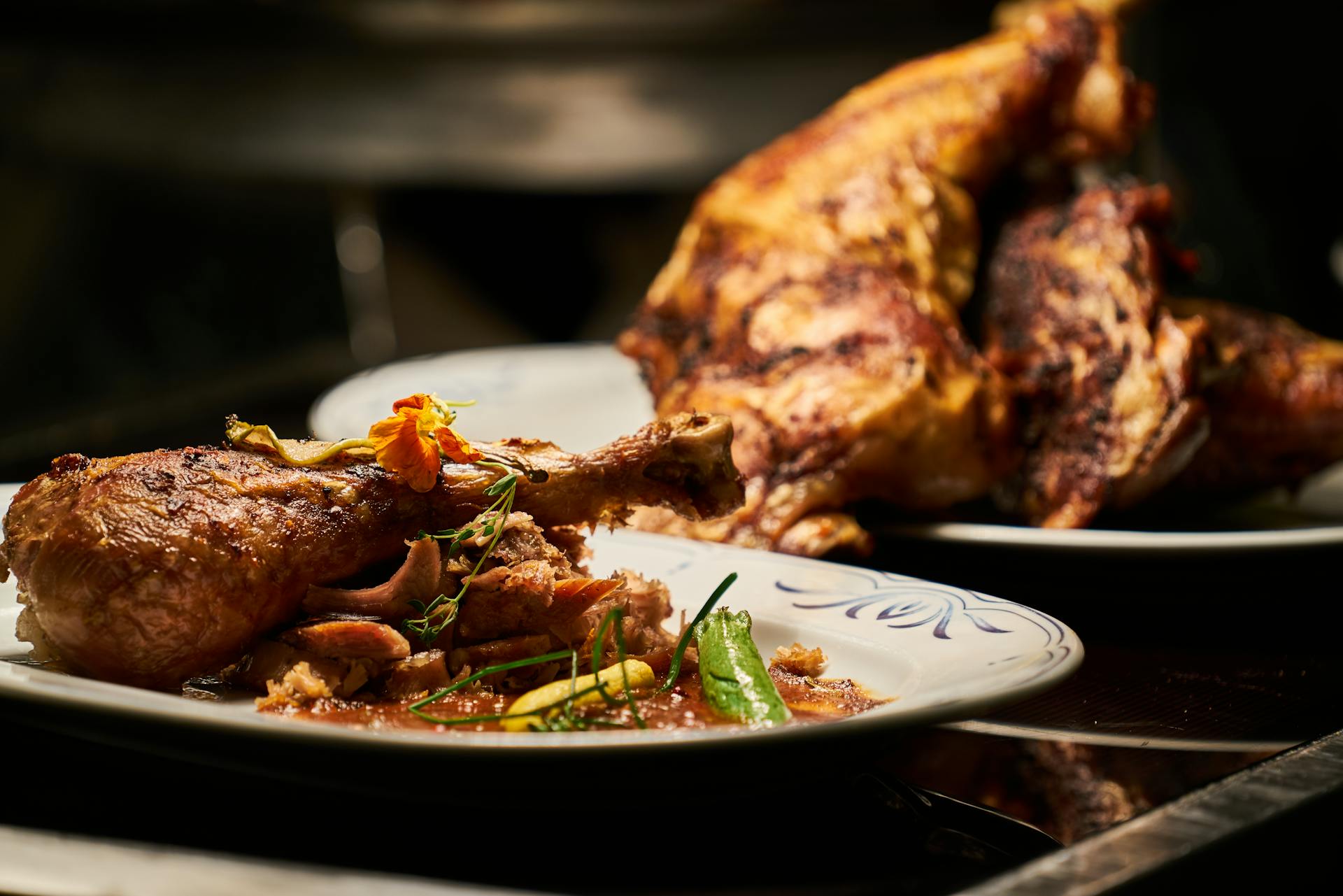
Cooking for your furry friend can be a game-changer for their health and happiness.
A well-planned cooked food diet for dogs can provide essential nutrients and reduce the risk of food sensitivities and allergies.
Dogs are naturally omnivores, which means they thrive on a diet that includes both animal and plant-based ingredients.
A balanced cooked food diet for dogs should include a mix of protein sources like meat, fish, and eggs, as well as complex carbohydrates like sweet potatoes and brown rice.
Broaden your view: Is Cooked Food Good for Dogs
Benefits of Homemade Food
Making the switch to a cooked food diet for your dog can have numerous benefits for their overall health and well-being. A diet lower in processed foods is linked with a longer life span in dogs, according to research by Habib and Becker.
By cooking your dog's food yourself, you can avoid ultra-processed foods and consume minimally processed foods, similar to the human diet. This can lead to less inflammation in dogs, which may affect not only physical health but also better cognitive function.
One of the main concerns with commercial dog food is that the formulation guidelines are set for highly active animals. This means that if your dog is less active, they may wind up nutrient deficient if you feed them according to the recommended amount.
By cooking your dog's food, you have more control over the nutrients to fit your specific pet's lifestyle and needs. Filardi, an animal behaviorist, also points to anecdotal evidence that a more nutritionally sound, home-cooked diet can significantly affect behavior.
Here are some key benefits of homemade cooked dog food:
- Better quality ingredients: Choose high-quality meats, grains, and veggies for your furry friends.
- Elimination of preservatives: Avoid harmful preservatives like nitrates, BHA, and BHT in your dog's diet.
- Customized recipes: Provide the appropriate calories and nutrients for your pet based on their weight, health, and age.
- Elimination of allergens: Completely eliminate the chances of any allergens being introduced into your dog's diet.
Preparing Homemade Food
To make homemade dog food, you'll want to gather some high-quality ingredients, including a fish oil or omega-3 supplement and any additional supplements your veterinarian recommends.
You'll also need some basic kitchen supplies, such as food storage containers and a kitchen scale, to ensure your recipes are consistent and you're feeding your pet the proper amount. Batch cooking is a great way to make things easier on yourself, and storing the food in the freezer until it's ready to thaw is a must.
To make batch cooking even simpler, consider investing in a prep mat and cutting board set specifically designed for dogs. This will help keep your kitchen clean and prevent cross-contamination.
Here are some essential supplies you'll need to get started:
- Reddy Thaw & Store Container For Dogs
- Winerming Puppy Dog Paw And Bone Silicone Molds
- Reddy Double-Sided Spatula For Dogs
- Reddy Prep Mat And Cutting Board Set For Dogs
- OXO Good Grips Stainless Steel Food Scale
- Nordic Naturals Omega-3 Pet Oil Supplement
- Open Farm Bone Broth
By investing in these supplies and following a few simple guidelines, you can create a healthy and balanced homemade dog food diet that meets your pet's nutritional needs.
Cooking and Recipes
Grounded Turkey Delight is a quick and easy recipe that can be made in 25-30 minutes, yielding 10 servings of 1 cup each.
This hearty dish can be paired with kibble and is a great starting point for pet owners looking to prepare homemade dog food.
It's essential to consider your dog's unique needs, as a Chihuahua and a Great Dane certainly do not eat the same amount.
You can find recipes online that already have ingredient information, making it easier to determine the right portions for your pup.
Consult with your veterinarian to ensure the recipes you're using meet your dog's needs, and ask for recommendations on multivitamin and mineral supplements.
Regular weigh-ins are crucial to maintain a healthy weight, so weigh your pup regularly at home or at the vet's office.
See what others are reading: Great Pyrenees Puppy Feeding Chart
5 Homemade Food Recipes
Cooking and Recipes are a great way to provide your furry friend with a healthy and happy meal. A balanced and healthy doggy diet must have at least 10% protein.
You can easily make your dog's meal more nutritious by adding vitamin and mineral supplements as advised by your vet. This will ensure your dog gets all the necessary nutrients for optimal health.
One of the simplest and tastiest dog food recipes is the Grounded Turkey Delight. It's quick and easy to make, and can be paired with kibble for a well-rounded meal.
This recipe yields 10 servings of 1 cup each and can be made in just 25-30 minutes. You can easily modify the serving size and ingredients to suit your pet's dietary and breed-specific requirements.
Here are the 5 vet-approved homemade dog food recipes that you can try:
- Grounded Turkey Delight
- Other recipes can be found in the article (not specified in the provided section)
Each of these recipes has been carefully crafted to meet your dog's nutritional needs, with a focus on protein, carbohydrates, fiber, and fat content.
Using Organ Meat for Health
Organ meat is a nutritional powerhouse that can be a game-changer for pets with specific health issues. Organ meats like liver, heart, and kidneys provide essential vitamins, minerals, and enzymes that aren't found in muscle meat.
For pets with heart disease, feeding them hearts can be a great way to provide the nutrients they need. Similarly, pets with liver disease can benefit from a diet rich in liver.
Green tripe, the stomach of ruminants like cows and sheep, is a superfood packed with probiotic and digestive enzymes. It's a great addition to a pet's diet, but be warned: it can be quite pungent!
Including 10% organ meat in a pet's diet is a common starting point, but the right amount may need to be adjusted based on individual needs.
Intriguing read: Dog Food for Dogs with Liver Shunts
Universal Fit?
A Chihuahua and a Great Dane certainly do not eat the same amount. You need to know what you're feeding your dog, so start by looking up recipes online that already have ingredient information.
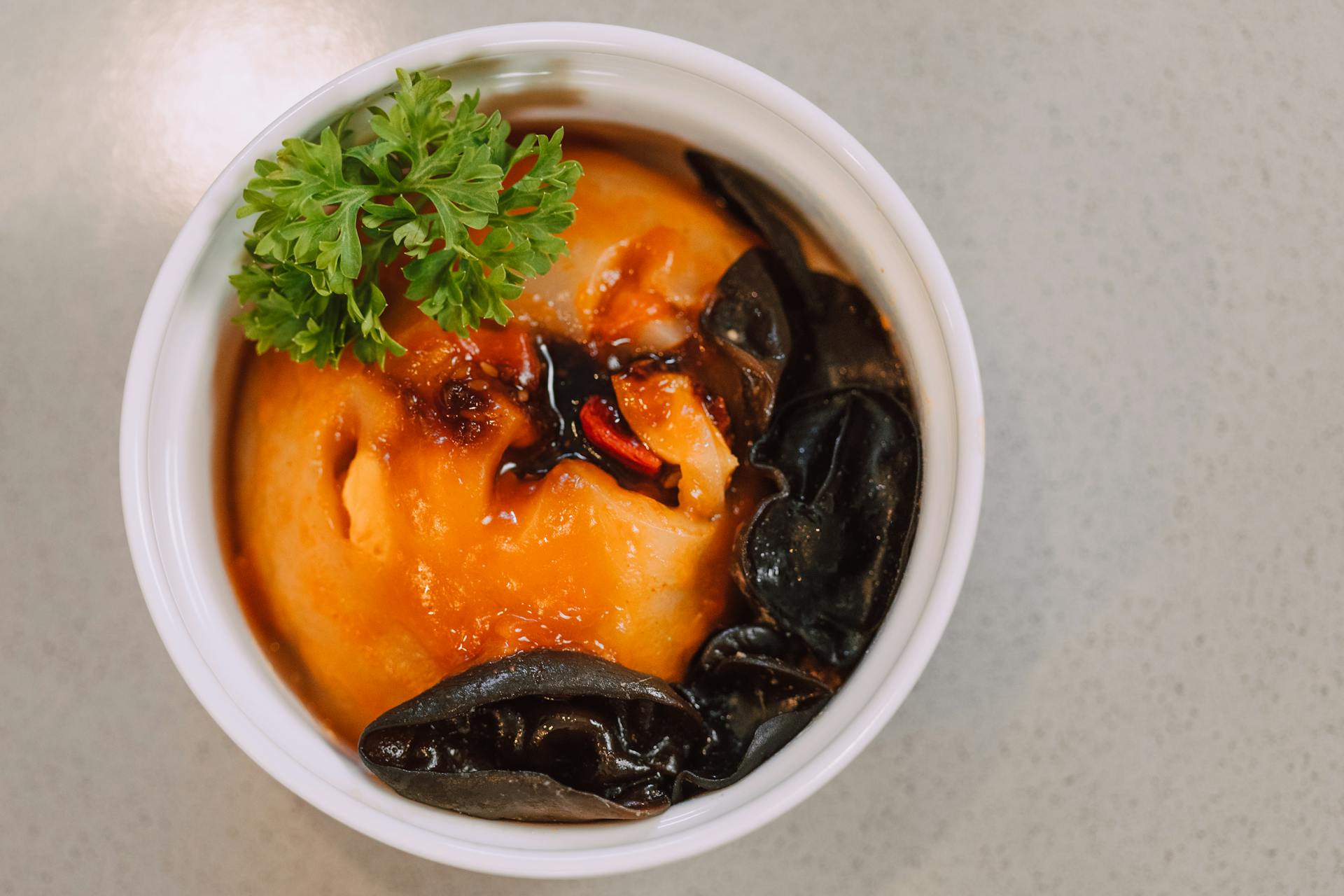
It's a good practice to show your veterinarian the recipes you've prepared (or plan to prepare) to be sure they meet your pup's needs. This is especially important if you're new to cooking for your dog.
We don't recommend obsessing over calories - just learning the basics and ensuring that your pup's health stays on track.
You should weigh your pup regularly to be sure they maintain a healthy weight. This can be done at home or at the vet's office.
If you're unsure of what a healthy weight range would be for your dog, check with your veterinarian. They can help you determine a healthy weight range for your pup.
A fresh viewpoint: Homemade Weight Loss Food for Dogs
Alternative Options
Cooking for your dog can be demanding on your time, labor, space, and finances, so it's perfectly fine to consider alternative options.
You can provide your dog with whole ingredients by purchasing carefully prepared ready-made meals that contain pre-cooked whole ingredients, which is very close to cooking.
These commercial foods can be just as beneficial as cooking for your dog's health, as long as you ensure you're catering to their individual health and nutrition needs.
You might enjoy: Just Food for Dogs Ingredients
Common Mistakes When Feeding Pets
Feeding pets requires attention to detail to ensure their health and well-being.
Consulting a board-certified veterinary nutritionist, like BalanceIT.com, can help create a semi-individualized diet for your pet.
Using dog-safe ingredients is crucial when cooking for your dog, so be sure to choose ingredients that are safe for them to consume.
Larsen and Bartges suggest consulting a reputable source to create a balanced diet for your pet.
BalanceIT.com is a reliable resource for creating a semi-individualized diet for your pet, making it a great place to start your research.
Alternative to Home Cooking
Home cooking for your dog isn't for everyone, and it doesn't have to be. Cooking for your pet is a demanding process that requires a lot of time, labor, space, and finances.
There are commercial foods that can be purchased that contain whole ingredients that are pre-cooked. These foods are very close to cooking, according to Dr. Bartges.
Purchasing pre-prepared food made with whole ingredients can be a great alternative to home cooking. This way, you can still provide your dog with a healthy and nutritious diet without the hassle of cooking.
Protein and Nutrition
Protein is a crucial component of a dog's diet, but it's not the only thing they need. A balanced diet should include a mix of protein, carbohydrates, and veggies. A good starting point is to aim for 40% protein, 50% vegetables, and 10% starch.
You'll want to choose protein sources that are lean and healthy, such as beef, turkey, chicken, lamb, pork, shrimp, and eggs. Avoid fatty or rich meats, and remove excess fat and skin. It's also essential to watch for poultry bones, which can splinter.
Here are some safe protein sources for your dog:
Remember to always check with your vet to determine the best protein ratio for your dog's specific needs.
Nutritional Breakdown for Homemade Foods
A balanced and healthy doggy diet is crucial for your furry friend's well-being. According to The National Academies, a healthy dog food must have at least 10% protein.
To ensure your dog gets the right amount of protein, you can choose from a variety of protein sources such as chicken, beef, fish, or eggs. The key is to find a balance that works for your dog.
Here's a breakdown of the nutritional requirements for homemade dog food:
By following these guidelines, you can create a well-balanced and nutritious diet for your dog.
Let's Talk Proteins
Dogs need a balance of protein, carbohydrates, and veggies in their diet, just like humans do. A good starting point is to aim for 40% protein, 50% veggies, and 10% starch.
Some dogs can't handle high amounts of protein, so it's essential to consult with your vet to determine the best ratio for your furry friend. This will ensure they're getting the nutrients they need without any adverse effects.
Here's a breakdown of the protein sources that are safe for dogs:
Remember to remove excess fat and skin, and watch out for poultry bones that can splinter.
Sources
- https://www.forbes.com/sites/forbes-personal-shopper/2024/04/26/homemade-dog-food/
- https://www.akc.org/expert-advice/nutrition/cooking-for-your-dog-dos-and-donts/
- https://unionlakeveterinaryhospital.com/blog/a-beginners-guide-to-home-cooking-for-dogs
- https://zumvet.com/blog/5-easy-cooked-dog-food-recipes-you-need-to-try/
- https://www.thisdogslife.co/the-beginners-guide-to-home-cooked-food-for-your-dog/
Featured Images: pexels.com
